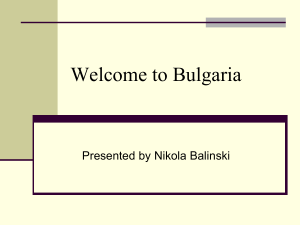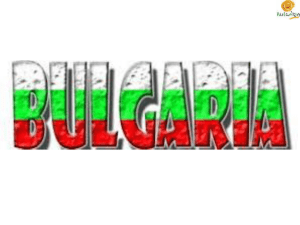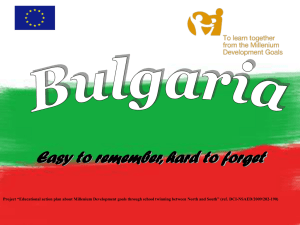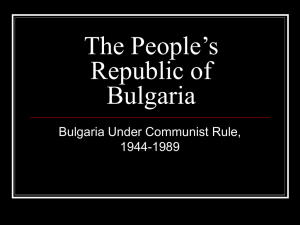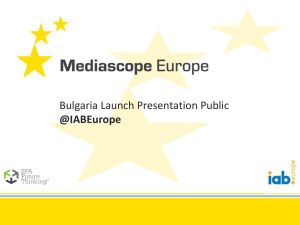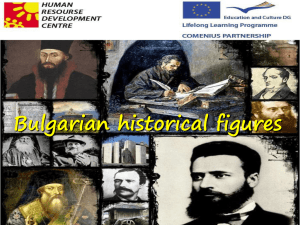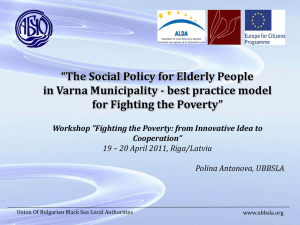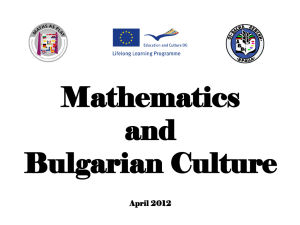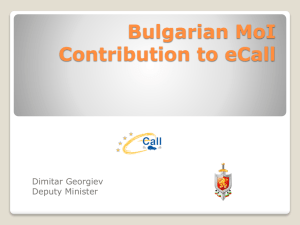Mediaeval Bulgaria, 681
advertisement
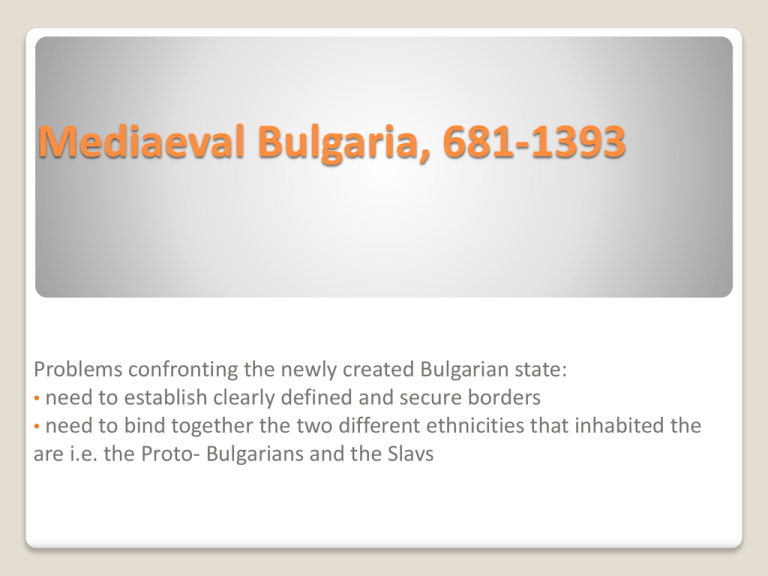
Mediaeval Bulgaria, 681-1393 Problems confronting the newly created Bulgarian state: • need to establish clearly defined and secure borders • need to bind together the two different ethnicities that inhabited the are i.e. the Proto- Bulgarians and the Slavs Chronology of Bulgaria 681-852 716 treaty with Byzantium awarding Bulgaria with northern Thrace. => Bulgarian state assisted Byzantium to fight the Arabs in Asia Minor. At that time chief of the Bulgarians was Khan Tervel Middle of 8th century Bulgaria included Moravia valley (today’s southern Romania, parts of Ukraine) as part of its territory. Lack of technological involvement impeded Bulgarians to create own navy and thus increase its territory on the north and south on its Black See boarders. => Expansion on ground to the north-west (collapse of the Avar kingdom led to new opportunities for bulgariang rulers); To the south and south west during the reign of Khan Krum(803814) Bulgarians acquired Sredets(Sofia) and Nesebur followed by march as far as the walls of Byzantim, Emperor Nicephorus lost his life in this epic battle. Chronology of Bulgaria 681-852 Khan Omurtag succeeded Krum (814-831), concluded a peace treaty and gained territories around Tundja valley and later Belgrade (Singidunum) ; He took advantage of the preoccupied Byzantines who were fighting on many fronts and by the middle of the century Bulgaria acquired Orid and Prespa and much of southern Albania. Omurtag continued his predecessor’s work in building proper legal system, but he was most appreciated for his notable achievements in reconstructing Pliska (burned in 811). Chronology of Bulgaria 852-888 The Reign of Boris I(852-888) and the Conversion to Christianity Christianity essential for Bulgarians as if they were to be accepted as an equal amongst the powerful states of Europe. Christianity is a powerful tool to lessen the gap between the two main ethnic groups in Bulgaria, the Proto-Bulgarians and the Slavs. Common language Slavo-Bulgarian (Slav tongue of the conquered masses predominated) Potential problem – the difference between pagan and Christian could provide a dividing line, which could be exploited by an external enemy. Expansion to the south of the Balkans and in Macedonia led to increase in Slavic population as well as christian prisoners during the 8th and 9th centuries. Key to centralize the Bulgarian state => Christianity Chronology of Bulgaria 852-888 864 – Boris accepted Christianity for himself and forced all his subordinates to do the same, 52 nobles rejected his order and were mercilessly executed Bulgarian Church was part of Byzantine church and was deprived of the right to have patriarch or to appoint its own bishops. => Fear in Bulgarians that Byzantine influence would increase through the Church. Boris seeks better terms from Rome. -> Rome refused to give patriarch or the right to appoint its own bishops so Bulgaria stayed locked to Byzantine church. 870 – High church organs in Constantinople ruled that Bulgaria’s church was to be headed by an archbishop chosen and dependent upon the patriarch in Constantinople. -> Greek missionaries were sent to educate the newly converted Bulgarians of the Christian canons. => thanks to the conversion by the 10th century there were Bulgarians as opposed to Slav and Proto-Bulgarians in the pagan Bulgarian state. Chronology of Bulgaria 852-888 Parallel to the process of conversion was the emergence of alphabet designed for Slavonic languages, it emerged in mid to late 9th century. The creation of the Cyrillic alphabet is generally acknowledged to Cyril and Methodius, they made it on request of the Moravian ruler in his attempt to decrease the influence of Franks and Germans over his nation. The introduction of the Cyrillic alphabet was of enormous importance for Bulgaria because it prevented the absorption of the Bulgarians by the Greeks to the south and the Franks to the west. Birth of Bulgarian literature- Kliment of Ohrid established thriving school embracing many studies. Alphabet was essential for creating legal code- “Zakon Sudnii Liudim” Alphabet enabled the Bulgarian Church to use SlavoBulgarian as the language of the liturgy Chronology of Bulgaria 893-927 The reign of Simeon the Great Raised and educated in Constantinople; In his first years at the throne he engaged wars with the empire and other neighbors => Extended boundaries westwards to the Adriatic, south to the Aegean and north-westwars to incorporate most of modern Serbia and Montenegro. Besieging Constantinople twice led to a peace treaty in 896 which gave the right to Bulgaria to have its own independent church. Simeon was given the title king or tsar by Byzantium. Change the capital city of Bulgaria from Pliska to Preslav. The peaceful 20 years after 896 led to flowering in literature and art as a whole. The prosperity was due to the close and healthy commercial relations of Bulgaria with the empire ; and through links with Venetia and the west world. Chronology of Bulgaria 896-1018 The end of the first Bulgarian Empire In 927 Simeon died and his son Petur succeeded him. Petur 927-970 ruled in years of decline for Bulgaria Continuous wars defensive wars, main threat – the Magyars in the north. Clashes with Byzantine to the south. => Weakening of the Bulgarian state in consequence of the long lasting wars. –the nation dreamed of the golden days of peace/the church fell to corruption and self-enrichment The 10th century marked the era when landowners steadily increased their economic and social power, due to the lack of centralized authority in the state. Hard times for the poor masses in the state-> alienation set in/ church no longer credible – some turned to Heresy (a willingness to withdraw from the world and its problems);Ivan Rilski (876,880-947) national saint and hermit Bogomilism – a flow that argues that the entire visible world was the creation of Satan; only human soul was created by God. The bogomils believed the gratification of all bodily pleasures to be an expression of the diabolic side of creation, they preached poverty and temperance and vegetarianism. Chronology of Bulgaria 896-1018 Bogomils’ philosophy questioned the social order by preaching that man should live in communities where property was shared and individual ownership unknown. Bogomils’ purpose was to satisfy the spiritual hunger amongst peasant masses. Bogomilism was essentially a reaction to the hardships that followed after the adoption of Christianity. The end of the 10th century was turning point to the rapid decline of the first Bulgarian state. Endless wartime with the Kievan Russians in the north and the resumed conflict with Constantinople in the south led in 971 to the fall of Preslav; it was conqueroed by the armies of Constantinople.-> end of Great Bulgaria of Krum, Boris and Simeon … new capital in Ohrid. Chronology of Bulgaria 896-1018 The Reign of Tsar Samuil (997-1014) 998 Bulgaria regained large part of its lost the territories south of Denube Strategic expansion in present day Albania and Montenegro due to the preoccupation of the empire to fight the Arabs from Asia Minor 1014 marks the year of the end of the First Bulgarian State- the final battle in Macedonia. -> 15000 captured Bulgarian soldiers from which 99 out of 100 were blinded and the remaining were left with one eye to guide. At the sight of his defeated army Samuil died in 3 days. Chronology of Bulgaria 1018-1185 Bulgaria under Byzantine rule Bulgarian church was allowed to continue as a separate national institution although it was under Byzantine rule. Gradually the Ohrid patriarch fell under Greek influence and Bulgarian bishops were no longer allowed to elect their own patriarch. Tax system changed for the worse New form of land-holding was introduced: the proniya – holders of this land had the right to its produce but could not pass it on by inheritance. 1040 Petur Delyan a descent of Samuil gathered an army and took Skopje, his revolt though was not nationalist movement but a protest against worsening social conditions.
